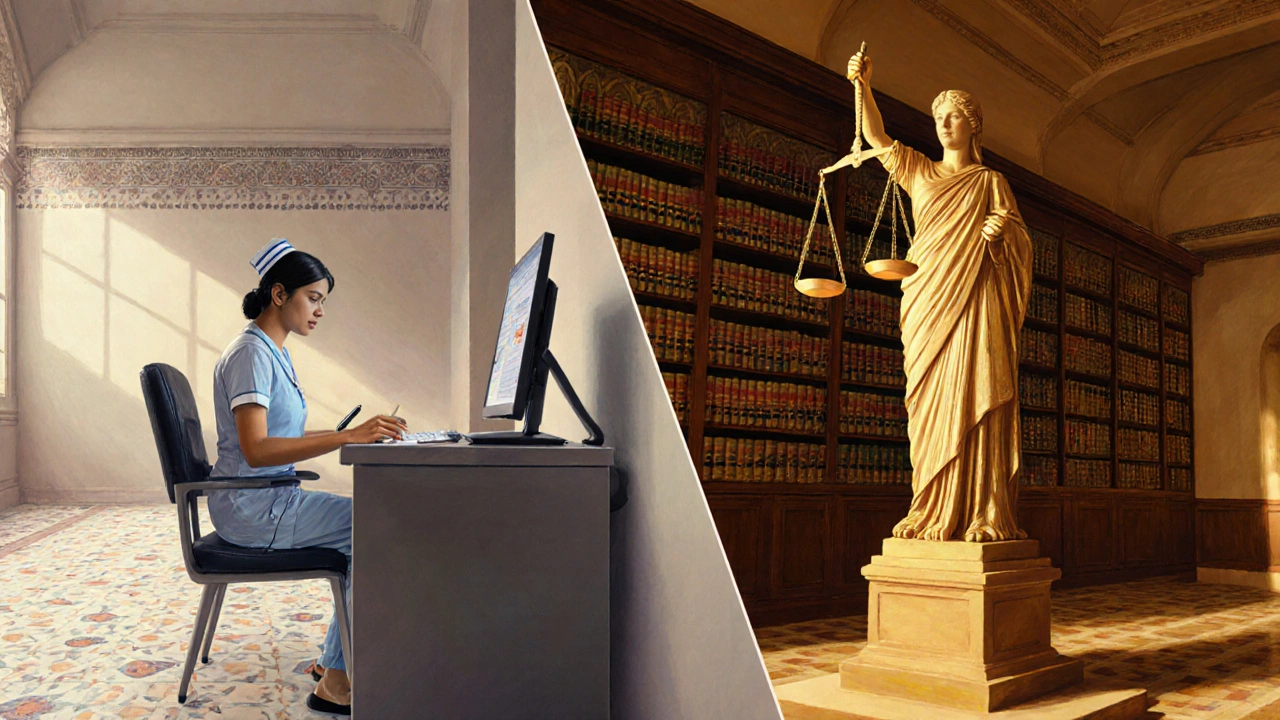NCLEX vs Bar Exam Difficulty Comparator
This tool helps you determine which exam might be harder for you based on your strengths and study preferences.
5
When you hear someone say "I’m studying for the NCLEX" or "I’m prepping for the bar exam," you instantly picture long nights, coffee‑filled desks, and a mountain of practice questions. But which of those two high‑stakes tests actually pushes you harder? This article breaks down the core differences, so you can see whether the nursing licensure exam or the lawyer‑licensing hurdle feels tougher for you.
Key Takeaways
- The NCLEX focuses on clinical decision‑making; the bar exam tests legal analysis and memorization.
- Pass rates hover around 85% for the NCLEX and 70‑75% for the bar, reflecting different difficulty levels and candidate pools.
- Both exams demand 300‑400+ hours of focused study, but the bar often requires more reading volume.
- Test format varies: NCLEX uses adaptive computer questions, while the bar relies on static multiple‑choice and essay sections.
- Personal strengths-clinical intuition vs. logical reasoning-determine which exam feels harder.
Below we’ll unpack each exam, compare them on measurable criteria, and give you practical tips no matter which path you choose.
What Is the NCLEX?
NCLEX is a computer‑based, adaptive licensure exam for prospective registered nurses in the United States. Developed by the National Council of State Boards of Nursing (NCSBN), it tests your ability to safely and effectively care for patients. The exam adjusts question difficulty in real time: answer correctly, and the next question gets a bit tougher; answer wrong, and it eases up. You need to demonstrate competence across four major categories: Safe and Effective Care Environment, Health Promotion and Maintenance, Psychosocial Integrity, and Physiological Integrity.
What Is the Bar Exam?
Bar Exam is a state‑administered test that determines whether a law school graduate is qualified to practice law. Most states use the Uniform Bar Examination (UBE), which combines the Multistate Bar Examination (MBE), the Multistate Essay Examination (MEE), and the Multistate Performance Test (MPT). The MBE’s 200 multiple‑choice questions assess knowledge of constitutional law, contracts, torts, criminal law, evidence, and real property. Essays and performance tasks gauge your ability to write legal arguments and apply law to realistic scenarios.
Hard‑Fact Comparison
| Metric | NCLEX | Bar Exam |
|---|---|---|
| Administering Body | NCSBN | National Conference of Bar Examiners (NCBE) |
| Typical Pass Rate | ≈ 85% | ≈ 70‑75% |
| Average Study Hours | 300‑400hrs | 350‑500hrs |
| Number of Questions | ~ 150 (adaptive) | 200 MBE + 6‑8 essays + 2‑3 performance tests |
| Test Length | Up to 6hrs (including breaks) | Two‑day exam, ~ 8hrs total |
| Primary Skill Tested | Clinical judgment & safety | Legal analysis & writing |
How Do the Formats Influence Perceived Difficulty?
The NCLEX’s adaptive format means you never know exactly which topics will appear, but you also never face a question you’ve already failed. This can create anxiety, yet it rewards strong fundamentals. In contrast, the bar’s static format lets you anticipate the content mix-most candidates study the “big seven” subjects repeatedly.
Another factor is the essay component. While the NCLEX is strictly multiple‑choice, the bar exam forces you to craft coherent arguments under time pressure. If you’re comfortable writing on the spot, the bar may feel less daunting; otherwise, the NCLEX’s focused clinical scenarios could be easier to manage.

Pass Rates: What Do They Really Tell Us?
A pass rate of 85% for the NCLEX suggests that most nursing graduates meet the competence threshold-partly because nursing programs often filter out weaker students before graduation. The bar’s lower rate reflects a broader pool of candidates, including many who have been out of school for a year or more and may be juggling jobs while studying.
Remember, pass rates are averages. Your personal background-clinical experience, reading stamina, test‑taking style-will shift the odds dramatically.
Study Time and Resource Investment
Both exams demand massive commitment, but the nature of the material differs. The NCLEX requires you to master thousands of nursing concepts, pharmacology facts, and patient‑care protocols. Many candidates use resources like UWorld, Kaplan, and the official NCSBN test plan.
The bar exam, especially the MBE, leans heavily on case law and statutes. Popular prep tools include BarBri, Themis, and the NCBE’s practice questions. For essays, you’ll need to drill issue‑spotting and outline writing, often with timed practice exams.
On average, aspiring nurses report 4‑5hours of daily study for six weeks, whereas law graduates often spread 300-500hours over three to four months, interspersed with work or clerkships.
Which Test Feels Harder for Different Learners?
- Visual/kinesthetic learners: May prefer the NCLEX’s scenario‑based questions that mimic real‑world patient care.
- Analytical readers: Might find the bar’s dense statutory language more aligned with their strengths.
- Time‑pressured multitaskers: Could benefit from the NCLEX’s adaptive pacing, which shortens the exam if you answer confidently.
- Essay writers: The bar’s essay section plays to their advantage, while the NCLEX lacks any writing component.
Practical Tips to Tackle Either Exam
- Create a master schedule. Block out study blocks that mirror the actual test day length-six hours for the NCLEX, eight for the bar.
- Use active recall. Flashcards work for pharmacology (NCLEX) and for key case citations (bar).
- Practice under timed conditions. Simulate adaptive runs for the NCLEX and full‑day mock exams for the bar.
- Review explanations, not just answers. Understanding why a clinical decision is correct builds the reasoning the NCLEX demands; dissecting why a legal answer is wrong hones bar‑exam intuition.
- Take care of your body. Both exams are marathon‑style; regular sleep, nutrition, and short breaks improve concentration.
The Bottom Line: Is the NCLEX Harder Than the Bar Exam?
If you rank difficulty by pass rate alone, the bar exam edges out as tougher. But if you consider personal aptitude, the NCLEX vs bar exam debate is less about absolute hardness and more about which skill set aligns with your strengths. Nurses who thrive on hands‑on decision‑making and quick pattern recognition often view the NCLEX as manageable, while lawyers who love dissecting complex texts and crafting persuasive arguments may find the bar less intimidating.
Ultimately, the “harder” label is a personal judgment. Choose the path that excites you, prepare strategically, and the exam-whether in scrubs or a courtroom-will feel like a final checkpoint, not an insurmountable wall.
Frequently Asked Questions
What is the average cost to sit for the NCLEX?
The NCLEX registration fee for U.S. candidates is typically around $200, though some states add a small additional charge for the licensing board processing.
How many days does the bar exam last?
Most jurisdictions use a two‑day format: Day1 covers the Multistate Bar Examination (MBE) multiple‑choice section, and Day2 includes essays and performance tests.
Can I retake the NCLEX if I fail?
Yes. Candidates can retake the NCLEX after a 45‑day waiting period, and there is no limit on the number of attempts, although each attempt requires a new registration fee.
Is the bar exam the same in every state?
Most states adopt the Uniform Bar Examination (UBE), which standardizes the MBE, MEE, and MPT components. However, a few states still use their own unique exams.
Which exam requires more reading?
Generally, the bar exam demands more extensive reading because candidates must absorb statutes, case law, and legal commentary across many topics, whereas the NCLEX focuses on applied knowledge rather than dense textual analysis.





Write a comment